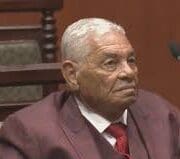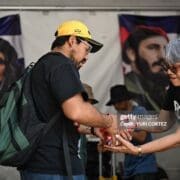Antigua’s Sir ‘Red’ Robin: Fifty Years of Leadership, Vision And Unmistakable Trust
By Dr. Isaac Newton
News Americas, NEW YORK, NY, Fri. Feb. 20, 2026: Few public officials anywhere in the world and the Caribbean hold the trust, respect, and admiration of their people for fifty years. Fewer still do so without pursuing it as a personal goal. Antigua & Barbuda’s Sir Robin Yearwood achieved this quietly, shaping a legacy built on purpose and service rather than recognition.
Sir Robin Yearwood has resigned as Member of Parliament for St Phillip’s North, Antigua and Barbuda.
I first met Sir Robin during my college and post-university years. For more than thirty years, I watched a man whose leadership was guided by character, informed by conviction, and measured by attention to the lives of those he served. Whether in opposition or government, he acted with intelligence, courage, and attentiveness. He encountered challenges that might unsettle most, yet he faced them with calm deliberation, careful judgment, and firm responsibility.
Sir Robin was more than a politician. He was a mentor, a guide, and a steady presence in his community. I remember his words, spoken in his own dialect with clear, deliberate force: “Dr Newton, always care for the people. Do not let them unsettle you. Never be so distant in principle that you cannot connect with them or serve them.”
He lived by these words. His home welcomed everyone. He attended funerals, graduations, weddings, and baby christenings without distinction. He stood as godfather to children of every faith and shared in both the successes and struggles of his constituents. His presence offered calm and reassurance. He turned leadership into a space where authority met humanity.
Sir Robin’s life offers three lessons for those who seek to lead.
The first is to lead with both heart and mind. Leadership is measured in presence, in listening, and in responding with thoughtfulness. Sir Robin built trust not only through speeches and initiatives but through relationships and deliberate acts that made people feel acknowledged, supported, and understood.
The second is to serve with integrity rather than ambition. His fifty years of service were never an exercise in titles or prestige. They showed that influence arises from steady commitment and moral clarity. Leaders who act from principle leave a mark far beyond the transient rhythms of politics.
The third is to remain grounded while anticipating the future. Sir Robin nurtured the soil of his own community while shaping the broader landscape of his nation. From supporting agriculture and animal husbandry to introducing innovations such as free incoming calls on APUA cell service, he combined careful stewardship with vision that embraced possibility. Leadership requires this balance between tending to what exists and guiding what can be.
Throughout his career, Sir Robin embodied strength and subtlety in equal measure. He was expansive in understanding, deliberate in manner, resolute in conviction, patient in approach, fearless in pursuit, generous in spirit, and discerning in judgment. His humor, humility, and faith deepened his leadership, making it both effective and human.
Fifty years of public service, countless offices held, initiatives advanced, and lives affected. Yet Sir Robin remains, first and foremost, a man connected to the people he serves. His legacy endures far beyond power and position. He constructed a life in which leadership and humanity were inseparable.
Those who aspire to lead can learn from him that service demands attention, that authority requires integrity, and that enduring impact requires navigating the needs of today while shaping the possibilities of tomorrow. Sir Robin Yearwood has shown that the measure of leadership is both in recognition and in the depth of transformation it brings to others.
EDITOR’S NOTE: Dr Isaac Newton is a globally experienced thought leader, Harvard, Princeton, and Columbia trained strategist, and advocate for social justice and leadership excellence. With over thirty years of experience bridging cultural, economic, and ideological divides, he brings a nuanced perspective to complex issues shaping global and regional landscapes.










